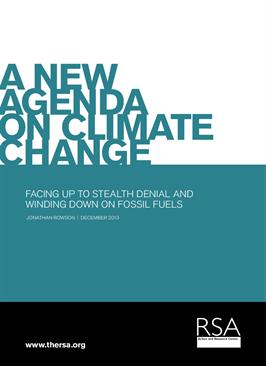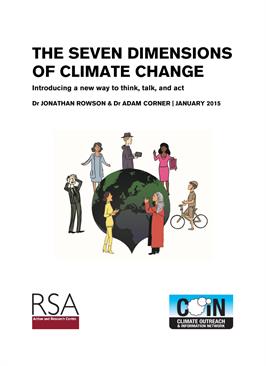About two thirds of the UK population appear to accept the reality of man-made climate change but are in denial about the responsibilities and actions that are necessary to deal with it. This ‘stealth' denial may be perpetuating contradictory behaviour, such as trying to minimise carbon emissions while maximising fossil fuel production. Understanding behaviour and behaviour change is key to creating consensus-based solutions.
The human response to climate change is unfolding as a political tragedy because scientific knowledge and economic power are pointing in different directions. Knowing the reality, causes and implications of anthropogenic climate change creates a moral imperative to act, but this imperative is diluted at every level by our inability to act collectively. Portraying climate change as purely environmental only adds to the problem by ignoring its broader systemic threat to the global financial system, public health and national security.
A new agenda is needed that acknowledges and responds proactively to our collective ‘stealth denial’ as well as the need to keep fossil fuels in the ground. Markets drive fossil fuel production and make energy investment decisions based on signals from government, which in turn follows democratic signals to make political decisions. This mixture of vested interests, political paralysis and civic ambiguity is responsible for the lack of progress on climate change.
This report argues that we should focus less on those who are disinterested in climate change or question the scientific consensus and concentrate on mobilising those with an underlying but latent desire to create solutions. What we appear to need most are forms of ‘behaviour change’ that get (some) people to change, in ways that get governments to change, in ways that get markets to change.
The report identifies the need to:
-
Build a powerful non-partisan climate alliance independent of the environmental movement, with clear campaign objectives.
-
Refocus the debate away from the existence of problems towards competing ideas about solutions.
-
Get more people talking to each other about climate change.
-
Lobby for consumption-based emissions reporting.
-
Divest shares in fossil fuels, reduce availability of debt for fossil fuel investment and redirect investment into renewable technologies.
-
Introduce a revenue neutral carbon tax at the point of extraction.
-
Localise energy responsibility through renewable energy feed-in-tariffs and extend carbon rationing action groups.
-
Use every opportunity to demonstrate reciprocal commitment to climate change.
pdf 794.9 KB
Contributors

Related reports
-
The Seven Dimensions of Climate Change: Introducing a new way to think, talk, and act
Our report suggests that climate change is not about 'the environment', it's a problem with seven main dimensions: Science, Behaviour, Technology, Culture, Law, Economy and Democracy.


Be the first to write a comment
Comments
Please login to post a comment or reply
Don't have an account? Click here to register.